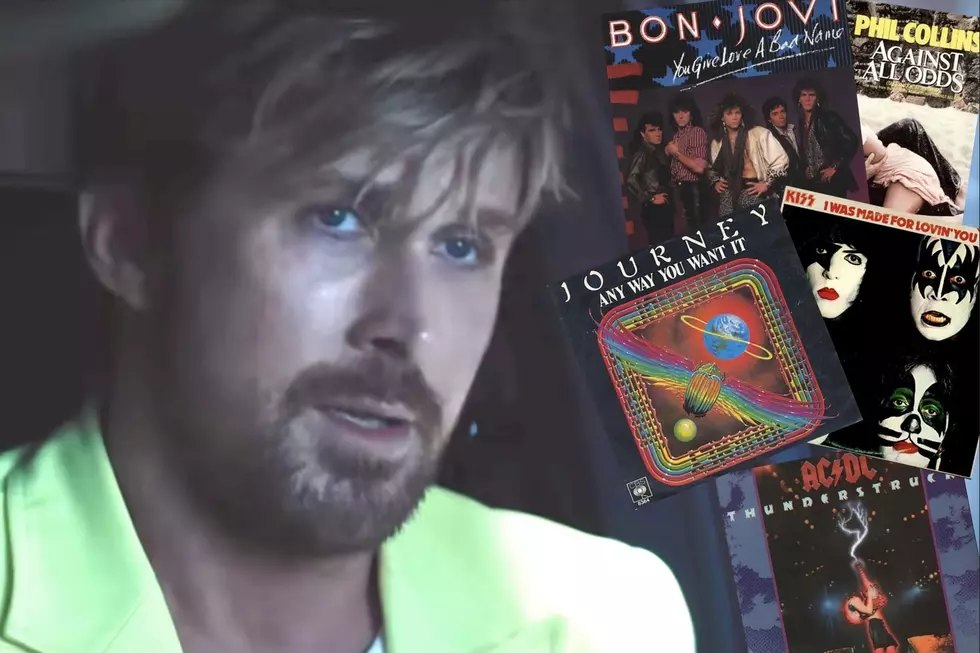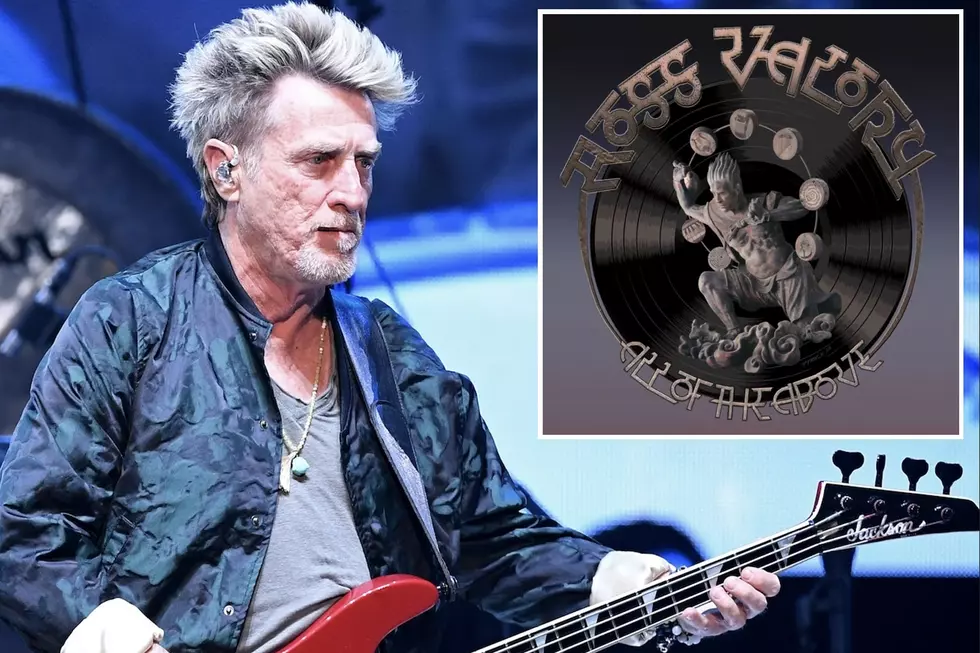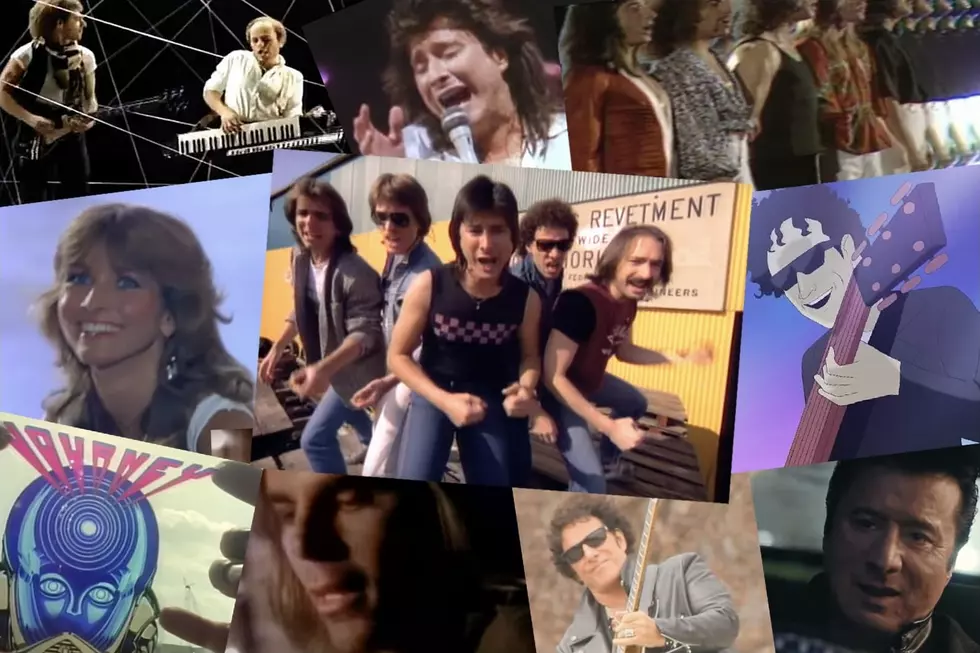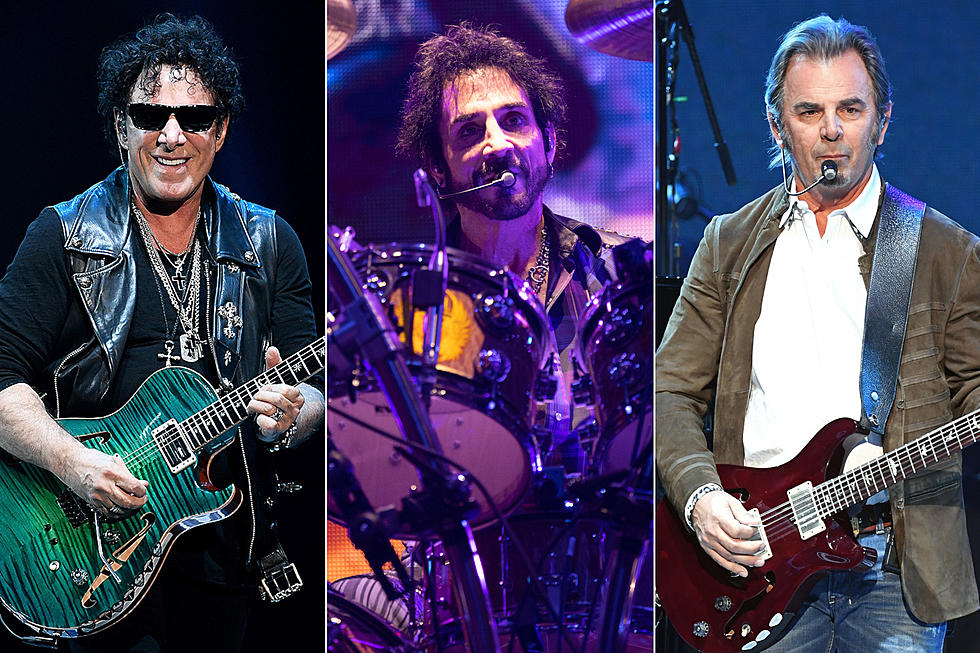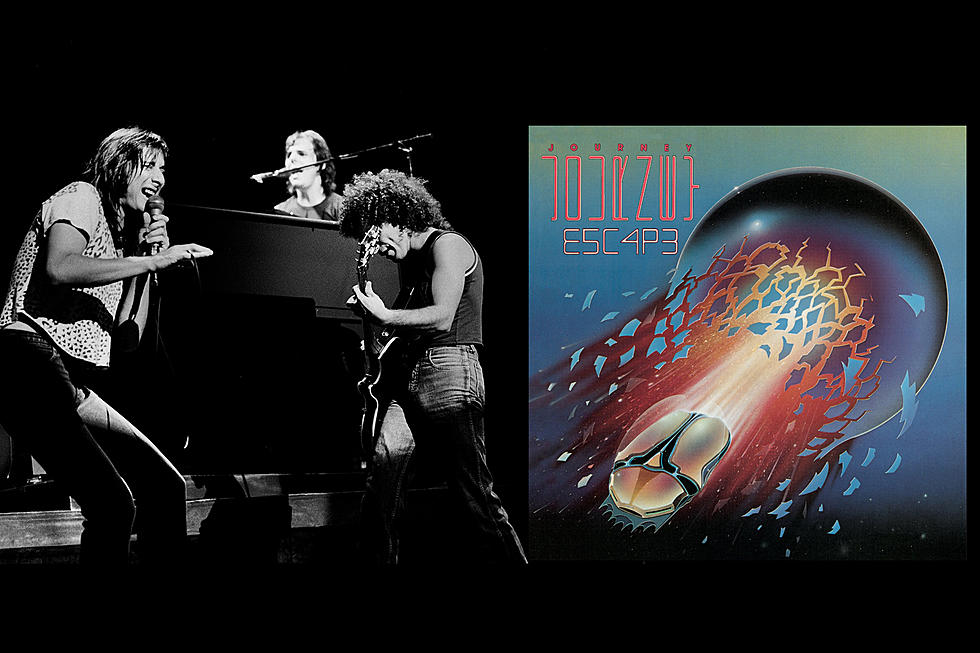
Journey’s ‘Escape’ at 40: Neal Schon and Jonathan Cain Look Back
"Don't Stop Believin'" is an apropos opener for Journey's Escape -- mostly because the band and its fans couldn't believe the way the album took off when it was released 40 years ago this month.
Marking a significant sea change in the band, with Jonathan Cain stepping in to replace co-founder Gregg Rolie, Escape was Journey's first (and, to date, only) album to top the Billboard 200 chart. It launched three Top 20 hits ("Who's Crying Now," "Don't Stop Believin'," "Open Arms") and was just recently certified Diamond for sales of more than 10 million copies, second only to 1988's Greatest Hits. Escape kept Journey on the road, playing to sold-out arenas and stadiums, for nearly two years, and it even spawned an Atari 2600 game the year after its release.
It's hard to imagine anyone getting tired of talking about a success story like that, and Cain and guitarist Neal Schon certainly aren't. They may be busy prepping for Journey's upcoming live dates -- including July 31 at the Lollapalooza festival -- and promoting the new single "The Way We Used to Be," but they took a few minutes to share a bunch of key takeaways from Escape as it celebrates its big 4-0...
Listen to 'Don't Stop Believin'" by Journey
They shot wide, often scored...
Schon: I love Escape. I think it's one of our better records -- probably my favorite record that we've ever done. I like them all for different reasons, but Escape I really like because it was a bit more bold and we were not afraid to go anywhere. It's so A to Z in the alphabet, musically; One song is "Open Arms" and another one is "Edge of the Blade" or "Dead or Alive," and they are all so different and all over the map. I feel Escape showed the diversity of the band, musically, and how much we could do.
Change was good ...
Schon: The Babys were opening up for Journey at the time, and Greg was expressing that he was burnt out from being on tour. We had done some really grueling work on tour, and of course before that he had done years and years of Santana, so it was a double whammy for him and he wanted to settle down and have a family and get off tour. Jonathan and I had a relationship musically on tour; We would go out to clubs and we'd jam and hang out and I realized he had a lot of things in common, musically. We're just kind of bouncing off each other. So when Greg decided to leave I just went, "Jonathan!" That was a natural place to go, and when Jon came in we just got in a room and played and it was great.
The invitation was a no-brainer...
Cain: I knew this was an extraordinary opportunity. I knew this was an extraordinary bunch of guys and musicians, and the brand they'd built had a lot of weight to it. It was a lot of responsibility to come into and join. I could've either been anxious about it or fearful about it or just simply put my head down and carry on. I chose not to look back, ever. I never looked over my shoulder once. It was my time to shine or get out of Dodge.
Change was good (II)...
Cain: They said to me, "Jon, we want to change our sound. We've been there, done that." I said, "To modernize the sound we need to go into the synth realm," and so we did -- more on Frontiers than Escape, but Neal and (singer) Steve Perry were fine with that, "Let's move on. Let's make different sounds."
The first idea was...
Cain: They had the title Escape right off the bat. Herbie (Herbert, Journey's manager) said, "Oh, this album's called Escape, and we didn't have anything written called 'Escape.'" That's when I heard Neal's (sings riff) and said, "There it is! That's 'Escape.'" So I was quick to recognize what each song's identity might be -- and I still do that today. When you think about it, Escape could actually be a play -- and I was playing around with a famous writer who still wants to do this Journey thing on either Broadway or Vegas, which would be cool.
Listen to 'Escape' by Journey
A guitar "army" was born...
Schon: I liked the fact that (Cain) played rhythm guitar, too, and was a good songwriter. He did a lot of things really well and just made us stronger.
Cain: I'd just learned electric guitar in the Babys. I was an acoustic guy forever before that. When we did "Stone in Love," Neal wanted me to play guitar, and I was so intimidated. He said, "Play this 12-string. It's gonna sound great" -- it was a Gibson double-neck, actually, like Jimmy Page played. I told Mike (Stone, co-producer), "I dunno, I think Neal should just play this," and he looked at me and said, "No, when you play it's just fine, Jon. There's something that happens when you two guys are in the room that's missing when Neal plays himself." To get that vote of confidence that I was good enough to play with Neal and worthy enough to be recorded, I'll never forget. Then I played on "Lay it Down" and "Keep on Runnin'," too, just these extraordinary moments for me playing a second instrument.
Change was good (III)...
Cain: Lyrically, they needed to speak with their fans. It was a simple message when I came in. I said, "I watched you guys 40 nights (on tour). You just need to speak to (the fans) through your songs, bring their lives into your songs, bring their lives into our songs, sing to their triumphs, sing to their fears, sing to their hearts." And that's what I brought. Something like "Don't Stop Believin'" is a perfect example.
"Don't Stop Believin'" was a no-brainer, too...
Schon: That's the song that just refuses to go away, right? (laughs) We talk about it so much, but really Jonathan brought in the chorus and I came up with the B section, and then (Cain) and Steve (Perry) threw around the melodies more and more and then Steve did his thing on it and, bam! Before you knew it we were in the studio recording it. And when it was done I went, "Man, that song is gonna be big on the radio." And it was, and still is. It just keeps on going. It's pretty amazing.
"Open Arms" shocked and awed...
Cain: Steve Perry pried "Open Arms" out of me, he really did. He was begging me for a ballad. And I had written that song when I was in the Babys and John (Waite) dismissed it. So I said, "Well I've got this ballad..." and I played it for him and said, "I have this chorus and I have this verse melody, but I don't have any lyrics for the verse." And he said, "Well, we're gonna write this and we're gonna record this thing," and when Steve sang it, it sounded extraordinary, and I knew the fans were not gonna believe this one.
Schon: That was one I couldn't digest back then. I heard it and was like, "What the....?"
Cain: Yeah, when I brought it in, Neal was shocked -- "Oh my god, what is this? What did you guys do?!
Watch the Music Video for 'Open Arms'
Steve Perry was the point man...
Cain: It was really a collective effort, but the thing I remember about Escape was Perry being such a great bandleader. There was never anything out of place. We would go over something, over and over, and he would study it; He played bass and drums, so he knew how those pieces fit together, and he was so meticulous as to every note and just so complementary to Neal and I -- "Neal, you do what you do right here, and Jon, you do this right there..." I had no idea that Perry was such a fan of my keyboard playing. He gave me free rein to do what I wanted to do, which was also really encouraging for the new guy.
Mission control got the job done...
Cain: Mike (Stone) and Kevin Elson worked in tandem. They were a great team together. Kevin would read the newspaper while we'd be trying and trying again. All we'd see is this newspaper, and "Try it again." "What? Huh? Alright..." (Stone) worked like a banshee and Kevin would kind of be the disinterested party until he heard something extraordinary happen, and then he'd put the newspaper down and react. Of course Kevin mixed us live and he knew the band's energy, and when we were tired he would send us home. And he was great for Mike because he knew each one of us and our abilities to get stuff right.
It was fantastic at Fantasy...
Cain: Fantasy (Studios in Berkeley, Calif.) was a great little studio. We used to go there and rehearse, and we realized how cool it was to rehearse in that little room, so we made Escape there. They had this little tile room Neal used to play his acoustic (guitar) in that sounded extraordinary. They had this nice (isolation) booth where Perry would sing and we could all kind of see each other. The grand piano was kind of in the center and there was a drum booth, which was a little weird. But it all sounded pretty damn good and Mike (Stone) made it sound like a coliseum. He was a genius.
The future beckoned…
Cain: Randy Jackson (Journey's bassist from 1985-87 and currently) was there at Fantasy. He didn't play on (Escape), but he stuck his head in now and then to cheer us on. He did play some stuff on Frontiers and, of course, on Raised on Radio. It's interesting he would be in the band eventually.
Recording was such a deal...
Cain: We made the album for $80,000, which was unheard of. Most albums were $250,000, $300,000. But we were so rehearsed we got all our basic tracks in about eight days -- including "La Raza del Sol" (the B-side of "Still They Ride") and maybe one other song. It was done so effortlessly.
A "Mother" of a song...
Cain: "Mother, Father" was extraordinary in the way it was created 'cause Neal had all these classic things he was working on with his dad, about four cassette tapes with ideas that I started studying and listening to and picking my favorites. I said, "This is one song, we've just got to figure out how it all works together." So Perry sat down and listened to the different bits and we figured out, "This'll be the verse, this'll be the intro, this'll be the chorus."
Listen to 'Mother, Father' by Journey
The road test was a success...
Cain: I think the first me we performed anything from Escape was in Calaveras County. We had a private little concert for all the radio programmers and program directors and we did a 35-, 40-minute show and we played Escape for them live, right there in the afternoon. And I remember the program directors going, "You got something here..."
It sold like a wheel in the sky...
Cain: We were selling as high as 200,000 units a week. That album was four-times platinum in a year and a half, two years maybe. I remember getting the first (platinum album) after a couple of months. Just extraordinary. Of course the album went to No. 1. "Open Arms" could never get to No. 1, though; It was always No. 2 because of Michael Jackson or Lionel Richie. We couldn’t bump that "Endless Love" song.
...despite the critics...
Schon: I remember at the time that critics didn't like it they couldn't just say, "Oh, they sound like AC/DC" or "They sound like Queen" or this and that. It was so diverse they couldn't quite put their finger on it, so they said, "That's crap." (laughs)
There was one mistake...
Cain: My only regret is we didn't film any of it. We don’t' have any films or pictures or anything of that record being made. I don't know why. It's just memories in my head...which are all great.
OK, there was one other mistake...
Cain: We had an opportunity to go to Europe with Escape, and regretfully we couldn't because Perry didn't want to go. He wouldn't fly. He said, "Well, it's not safe for Americans to go over there. There's bomb threats," and this and that. I think it was probably because we played so much in the U.S. and Canada, he was just burnt out. It was brutal. But we had a chance to do big festivals in Sweden and Germany and the U.K., and we passed on 'em. I think it's a huge mistake; It would've been totally different for the brand, because you needed to get over there and play those shows. We probably should've done half of what we did (in North America) and then go over to Europe.
Journey Albums Ranked
More From Ultimate Classic Rock
